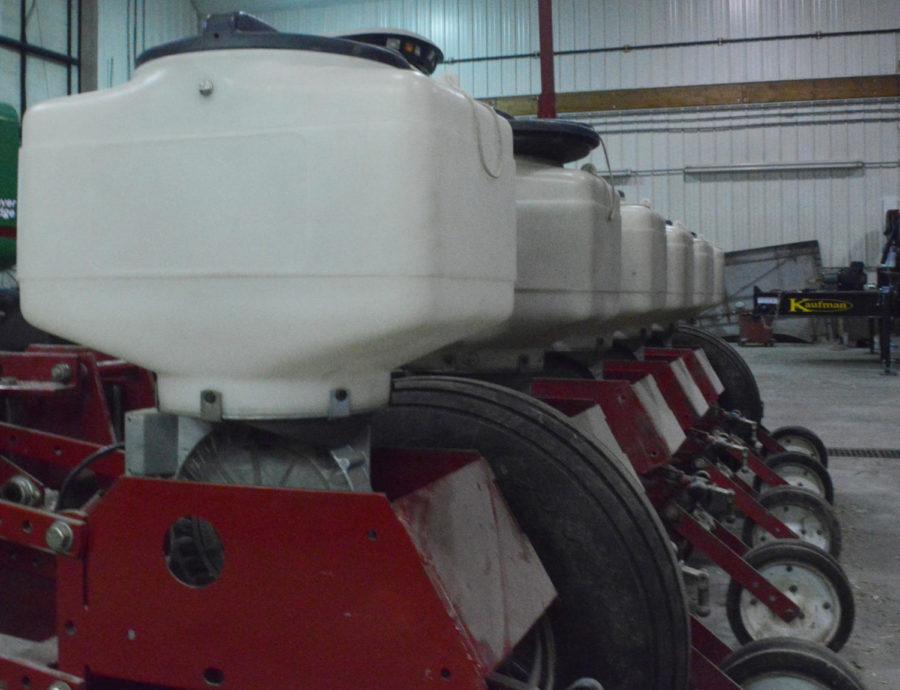ISU graduate develops advantageous planter product
This is an example of a planter much like the ones to which Colin Hurd’s invention, the TrackTill, would attach. Hurd is a 2013 agriculture graduate of Iowa State.
January 16, 2014
An ISU 2013 agricultural studies alumnus, Colin Hurd, recently developed a new planter product, called TrackTill, which helps farmers during the planting season.
“[TrackTill] is a product that attaches to planters to help reduce compaction from the wheels,” Hurd said. “As planters have gotten larger in the last few years, they have also gotten heavier for a number of reasons.”
TrackTill, which is a patent pending product, attaches behind the wheels on the planter and vertically tills the soil. It also addresses the tractor and its wheels and weight.
Hurd said the primary reason planters have gotten heavier was because of the structural differences between older and more modern planters. Older planters store all of the seeds on top in boxes called row units, and newer planters, like the common Central Commodity System Planter, store all of the seeds in one central location. That puts a big portion of the machine’s weight on the carrying wheels of the planter.
“All that weight is concentrated on those four center wheels of the planter,” Hurd said. “In turn, it causes more compaction in the soil.”
The tractors that pull the planters are also getting bigger, too, so the bigger the planter purchased, the bigger the tractor needed to pull the planter. That all adds up to more weight and more soil compaction.
Hurd also said compaction is often addressed with tillage, though after planting, it is detrimental to till the field.
“That helps reduce the compaction and, in turn, increases yields lost in those center rows [where the weighted-down wheels are located],” Hurd said.
There are currently two models of TrackTill available. They include TrackTill Frame Mount and TrackTill Wheel Mount. TrackTill Frame Mount is designed to fit a 30 inch row planter, having been tested to fit John Deere Bauer Built planters. The TrackTill Wheel Mount is designed to mount around the wheels on 30 inch row planters, and have been tested to fit 24-row John Deere 1770 NT planters.
According to a study conducted by Iowa State and Hurd during the last growing season, which collected data from three different locations and 48 individual plots, using TrackTill has shown better crop yields.
“When you compact soil, it limits the ability for root growth,” Hurd said. “It limits, essentially, how easy it is for the roots to penetrate the soil to gain nutrients. When you do that, in a lot of cases, it will make the plants grow shorter and yield less.”
Hurd also said the compaction problem is worse with corn because of the crop’s fibrous root system that is prone to more severe compaction issues.
“[Compaction and corn crops] are a big deal to Iowans,” Hurd said.
Hurd said the ISU study showed TrackTill to give fields a yield average of 8.12 more bushels. There was also a 6.5 percent increase in plant height, an average of 16.5 percent less compaction resistance and a 4.5 percent relative yield increase.
Hurd first came up with the business idea in his agricultural entrepreneurship course at Iowa State and then remembered past agricultural experiences.
“I was working on a farm, and it was a year the compaction showed up really well in the soil,” Hurd said. “You could actually see, with every pass of the planter through the field, that the corn was yellower and shorter than the rest of the corn that was surrounding the wheels.”
Hurd knew his idea was unique and a working solution to a problem.
“I said to myself, ‘Well, this is a real problem, I know it exists and as far as I know, no one else has come up with a good solution to it.’ I started working on it then and haven’t stopped since.”
With TrackTill’s success, Hurd hopes farmers realize the advantages of their potential investment.
“It comes down to money,” Hurd said. “[Farmers] are able to save money, increase yields and get a better return on their investments.”
This upcoming spring, Hurd is taking TrackTill to market, going full-scale, by launching the product through several John Deere dealerships.







